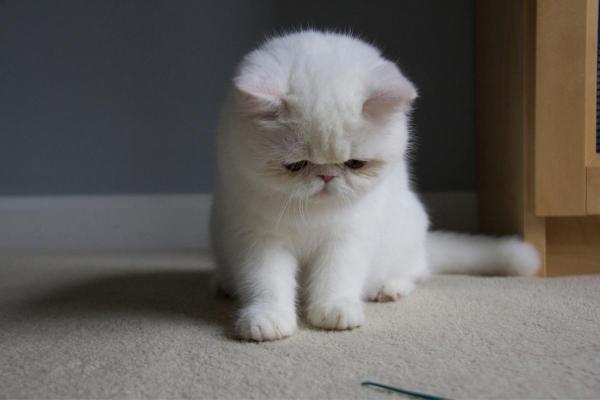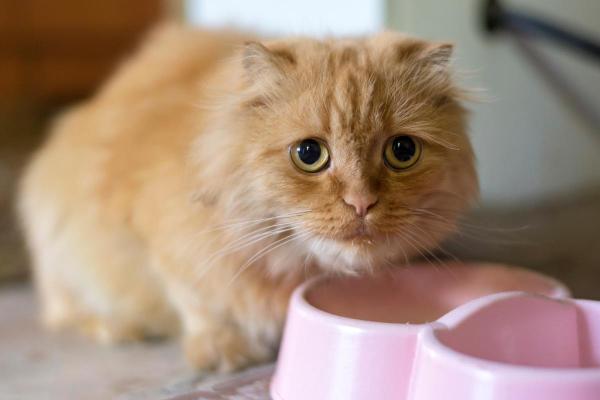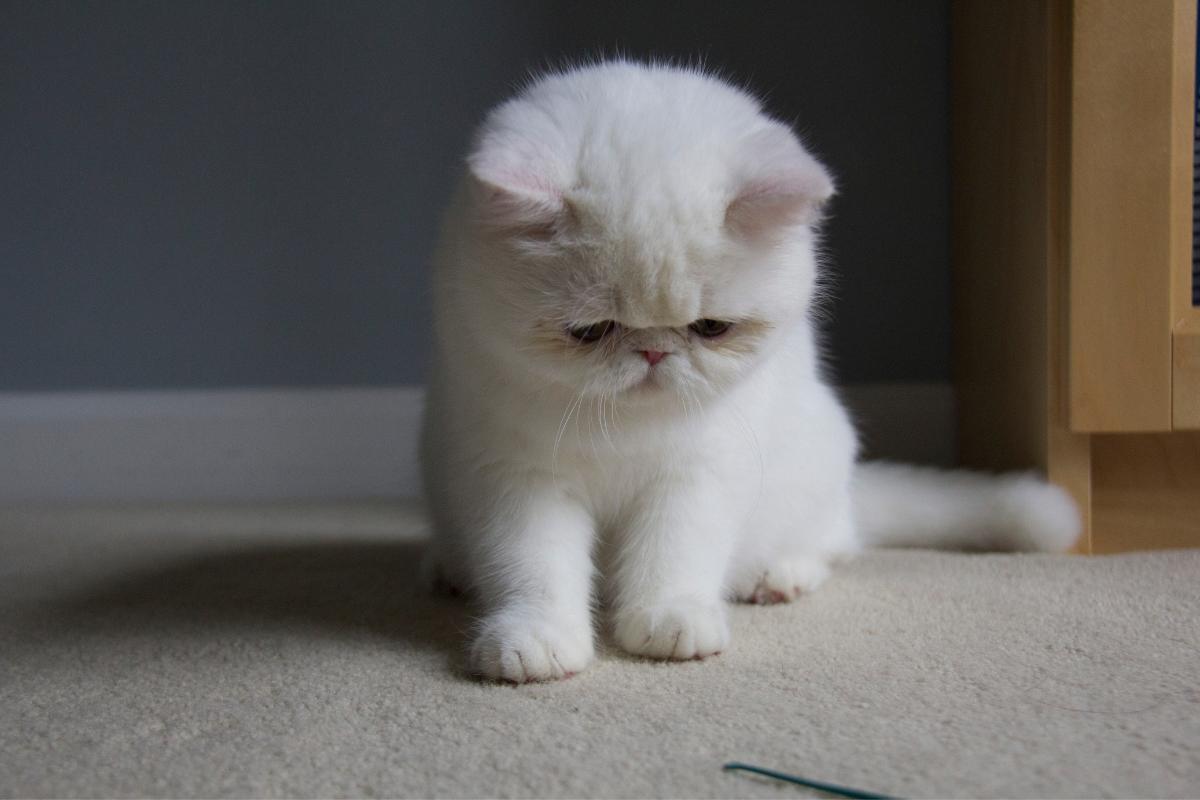Can Cats Die From Depression?



See files for Cats
Cats living as companion animals in our homes have their needs covered by their guardians. Despite a preconception of being solitary and even selfish, domestic felines develop close bonds with their human companions. The strength of these bonds will depend on the individuals involved, as well as environmental, health and other factors. When these bonds break, it is understandable there will be emotional repercussions. A cat will be happy when they have security, comfort and affection. When these elements are gone from their lives, it is understandable they will be unhappy, sad or depressed. The effects can be wide ranging, but AnimalWised asks can cats die from depression? We look at how mental health problems affect cats and what we can do about them.
Can a cat die from depression?
Some of us do not consider the emotional ability of our cats, while others might overestimate the capacity or breadth of feline emotions. Both are unhelpful when dealing with a depressed cat. If we think they are merely cat food-eating machines which see us as little more than servants, we may minimize a cat's depression. If we think they have the same emotional capacity as humans, we may treat them inappropriately.
The scientific evidence suggests that cats are not only able to experience emotions, but they are able to experience more than one emotion at the same time[1]. One of the main challenges in understanding cat mental health is identifying and associating certain behaviors with particular emotions. The same behavior is often attributable to different emotions. Since we cannot ask the cat directly, they are somewhat open to interpretation.
Despite challenges and limitations, we can deduce that cats are able to experience a range of emotions. Much of our understanding of cat emotion is derived from data taken directly from cat caregivers. While there is a possible trend for bias, this data suggests cats are able to experience emotions such as joy, anger and sadness. They will not be able to experience many of the more complex emotions that humans can, but a recent study concluded that domestic cats are also likely able to experience grief[2].
This sadness appears most acutely when they experience the loss of a companion. This can be another feline or even their human guardian, but it will only be someone with which they have developed a strong bond. Other situations can also cause sadness or depression, such as neglect, stress or abandonment. Moreover, cats are not only able to experience their own emotions, but they are able to recognize the emotions of others in the home[3]. this is a form of emotional contagion which can also affect their own mental health.
Now we know they can experience mental health problems, we want to know whether depression can kill cats. The answer is not straightforward, but it is a qualified ‘yes’. Sadness will not kill a cat directly. Experiencing this emotion on its own will not lead to death. However, the stress of a prolonged state of sadness or depression will have physical repercussions. These repercussions can exacerbate preexisting health conditions or lead to new ones.
Experiences such as the loss of a companion, physical health problems, environmental changes and emotional abuse can result in depression and other mental health issues. Prolonged subjection to such stimuli can have adverse effects such as not eating, neglecting hygiene and lowering of the immunes system. This can expose the cat to potential illnesses or failures in their organism which can indirectly result in the death of the animal.

How can a cat die from depression?
As we have explained, sadness or depression in cats will not be directly fatal. However, when a cat is experiencing mental health problems for a long time or they experience depression after being previously weakened, it can indirectly lead to the cat's death. For this reason, we look in more detail at how a cat can die from sadness:
- Prolonged lack of appetite: not eating will have a seriously deleterious effect on your cat's physical health. When prolonged for a sufficient amount of time, the cat's body will start breaking down fat stores for energy. This process will eventually lead to a condition known as hepatic lipidosis or fatty liver, a serious and potentially life-threatening disease. Left untreated, this will result in liver failure in the cat and eventual death.
- Gastrointestinal problems: the emotional stress of depression can affect the cat's digestive system, resulting in issues such as vomiting, diarrhea or constipation. If left untreated, these problems can lead to dehydration and malnutrition, as well as more serious complications that can have fatal outcomes.
- Inactivity: a cat that is deeply sad may lose interest in playing or moving around, reducing their physical activity. In turn, this mental health issue contributes to obesity, joint problems and overall worsening of their health. Without mental stimulation, their well-being also continues to deteriorate.
- Destructive behaviors: such behaviors include overgrooming which can lead to hair loss, skin lesions or infections. They may also start compulsively biting or scratching themselves, worsening their physical condition.
- Weakened immune system: prolonged stress and sadness can also weaken a cat's immune system, making them more susceptible to infections, respiratory problems, digestive problems or chronic diseases. A weakened immune system can also waken dormant infections such as those caused by feline herpesvirus. A sad cat might not be able to fight off these illnesses as effectively as a healthy cat would.
Now that you know that a cat can die of depression, we find out how to know sadness is affecting your cat's physical and mental health.
Warning signs of depression in cats
When you notice changes in your cat's behavior, it is important to rule out mental health problems or negative emotions. Some signs that can be seen in sad or depressed cats include the following:
- Loss of appetite: a cat that stops eating normally or shows less interest in its favorite food may be a sign of sadness or emotional distress.
- Excessive or lack of sleep: although cats sleep a lot, a sad cat may sleep more than usual. Conversely, others may develop insomnia or difficulty resting.
- Isolation: depressed cats may avoid social contact, hide more than usual or seek solitude in dark, secluded corners.
- Lack of interest in activity: cats normally enjoy playing, but a cat with depression may lose interest in these activities, becoming apathetic.
- Excessive meowing or changes in vocalization: some cats meow more than usual, seek more attention or express discomfort when depressed, while others may become quieter.
- Neglected grooming: if a cat stops grooming themselves or their fur looks unconditioned, they could be experiencing depression or emotional stress.
- Changes in litter box usage: your cat may start urinating outside of the litter box, indicating they are not well emotionally or physically.
- Aggression or irritability: a cat that is emotionally unwell may become more aggressive, overreacting to stimuli or avoiding physical contact.
Understanding why depression can kill a cat is important. If we recognize the above signs in cats, the following section will help us to know what to do. Learn more about signs of depression in cats with our article explaining why a cat cries all the time.

How to stop a cat dying from depression
Since a cat's mental health can affect their physical well-being, the first thing we need to do when we see the above signs of depression in our cat is take them to a veterinarian. As poor mental health can also be a result of a physical health problem, the vet can examine the cat to diagnose any underlying issues. If the problem is indeed physical, they can instigate the administration of treatment.
For guardians, we will want to minimize or eradicate our cat's depression. Poor mental health is often the result of a stressful time for the cat such as the loss of a beloved companion, but the origin can also be idiopathic. In addition to treating depression in cats, we will also want to prevent them from becoming depressed in the first place. To do this we can:
- Ensure their basic needs are met: cats which do not have their basic needs are more likely to feel insecure and stressed, something which can lead to depression. We should analyze our cat's needs and ensure we are meeting them correctly, such as providing the right diet or giving them a quiet place to rest.
- Routine: since cats are creatures of habit, we will need to ensure they have a suitable routine. Once such a routine has been established, we need to be consistent in adhering to it. A lack of consistency can lead to stress and depression.
- Positive interaction: since boredom or a lack of stimulation can result in depression, we must ensure we provide positive interaction to our cat. Different cats have different needs, with some needing more physical stimulation than others.
- Affection: similarly, cats will have different needs when it comes to affection. Some will seek it out all the time, others will need more time on their own. Find out your cat's needs and meet them appropriately.
- Environmental enrichment: even when we are not physically present, we need to help our cat stave off depression. Environmental enrichment for cats in the form of toys, scratching posts, wall-mounted rest spots and other accessories can help improve our cat's mood.
- Feline ethologist: for a cat experiencing acute depression, we may have trouble dealing with the problem on our own. A qualified feline ethologist or behaviorist can help assess our cat's individual needs and provide practical behavioral modification techniques to help prevent a fatal outcome from depression.
As we have seen, sadness, depression and other mental health problems are exacerbated by stress. Take a look at our related guide sharing the reasons why a cat is stressed to learn more.

This article is purely informative. AnimalWised does not have the authority to prescribe any veterinary treatment or create a diagnosis. We invite you to take your pet to the veterinarian if they are suffering from any condition or pain.
If you want to read similar articles to Can Cats Die From Depression?, we recommend you visit our Mental problems category.
1. Ellis S. L. (2018). Recognising and assessing feline emotions during the consultation: History, body language and behaviour. Journal of feline medicine and surgery, 20(5), 445–456. https://doi.org/10.1177/1098612X18771206
2. Greene, B. & Vonk, J. (2024). Is companion animal loss cat-astrophic? Responses of domestic cats to the loss of another companion animal. Applied Animal Behaviour Science, 277.
https://doi.org/10.1016/j.applanim.2024.106355
3. Quaranta, A., d'Ingeo, S., Amoruso, R., & Siniscalchi, M. (2020). Emotion Recognition in Cats. Animals: an open access journal from MDPI, 10(7), 1107.
https://doi.org/10.3390/ani10071107







